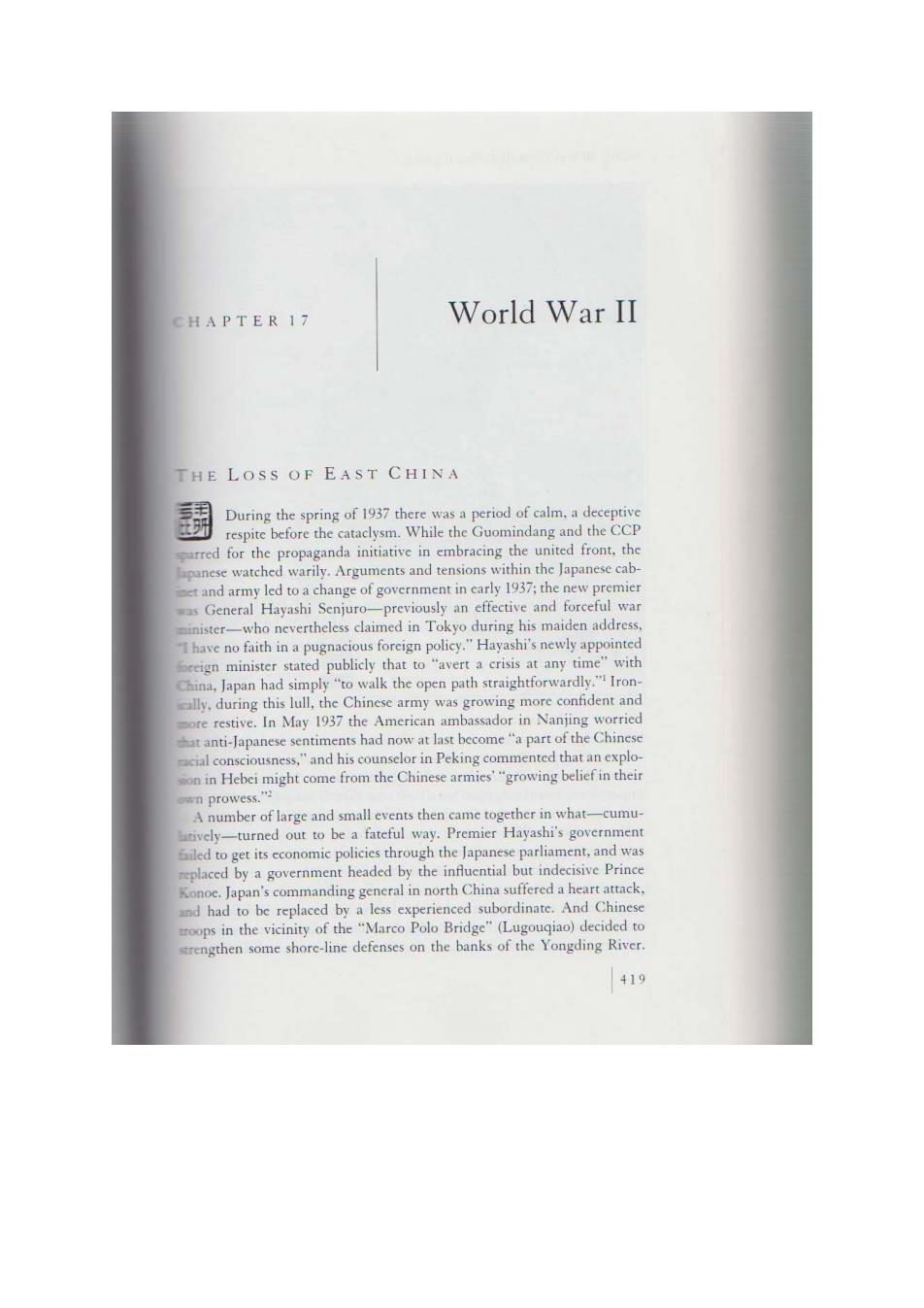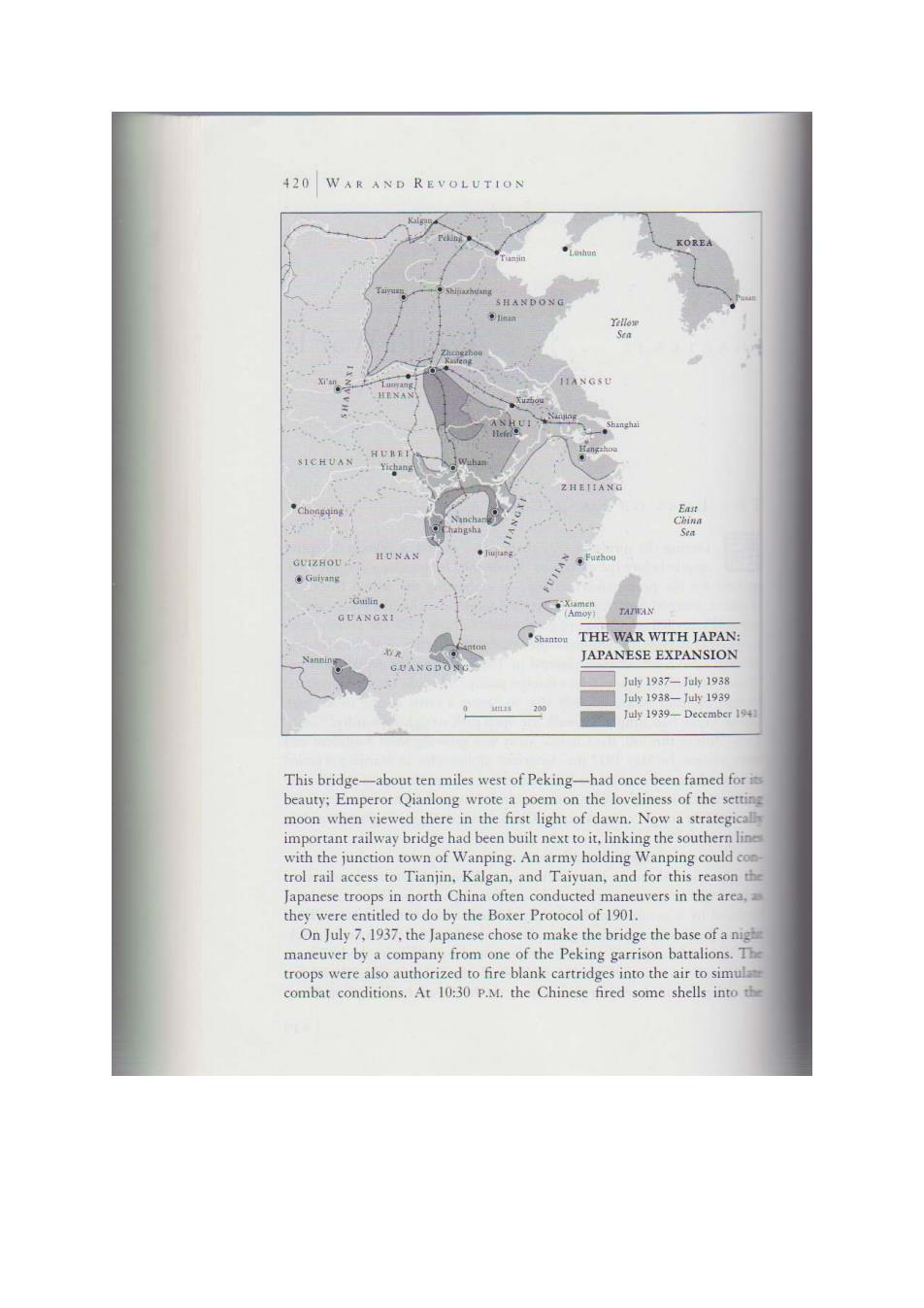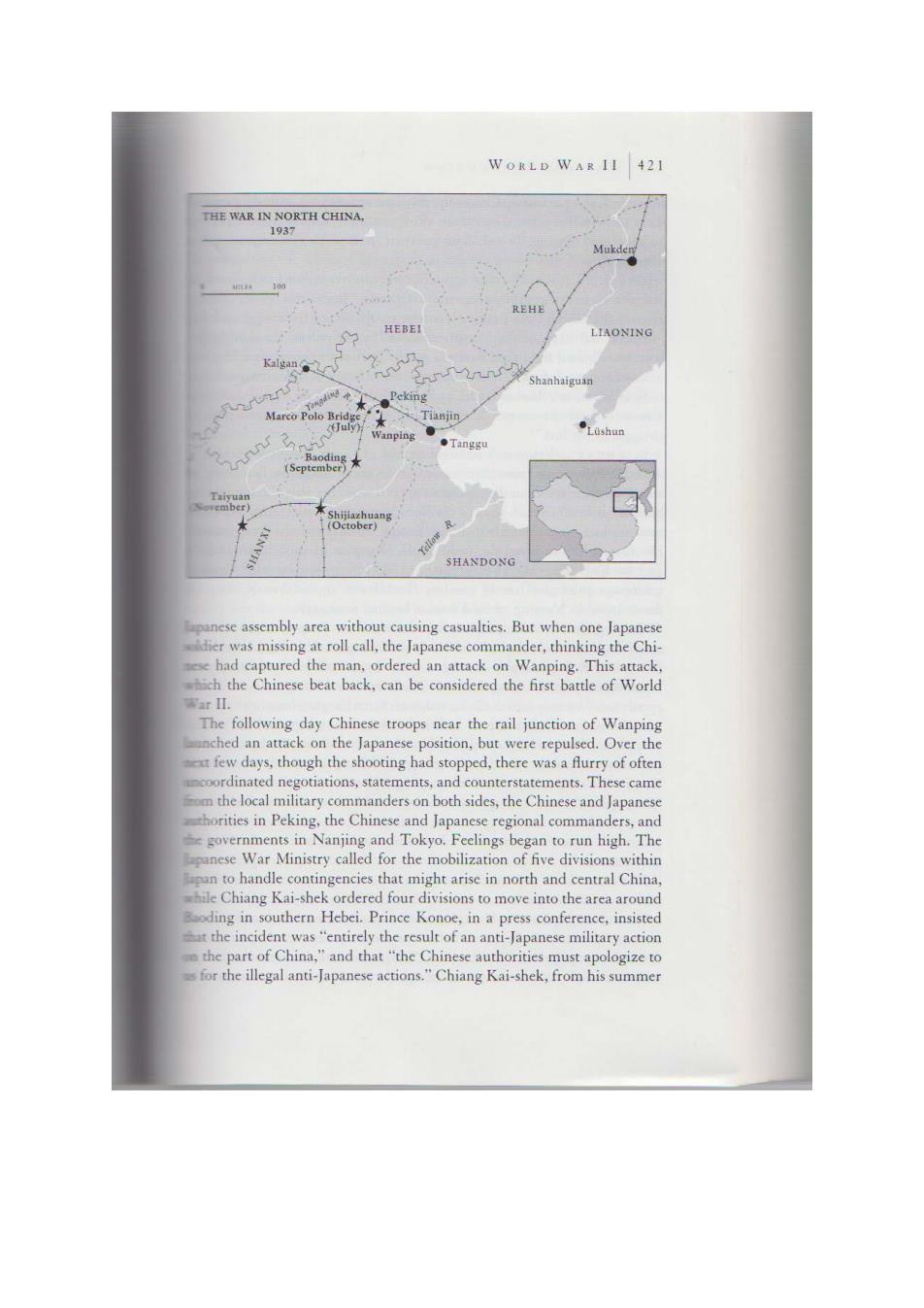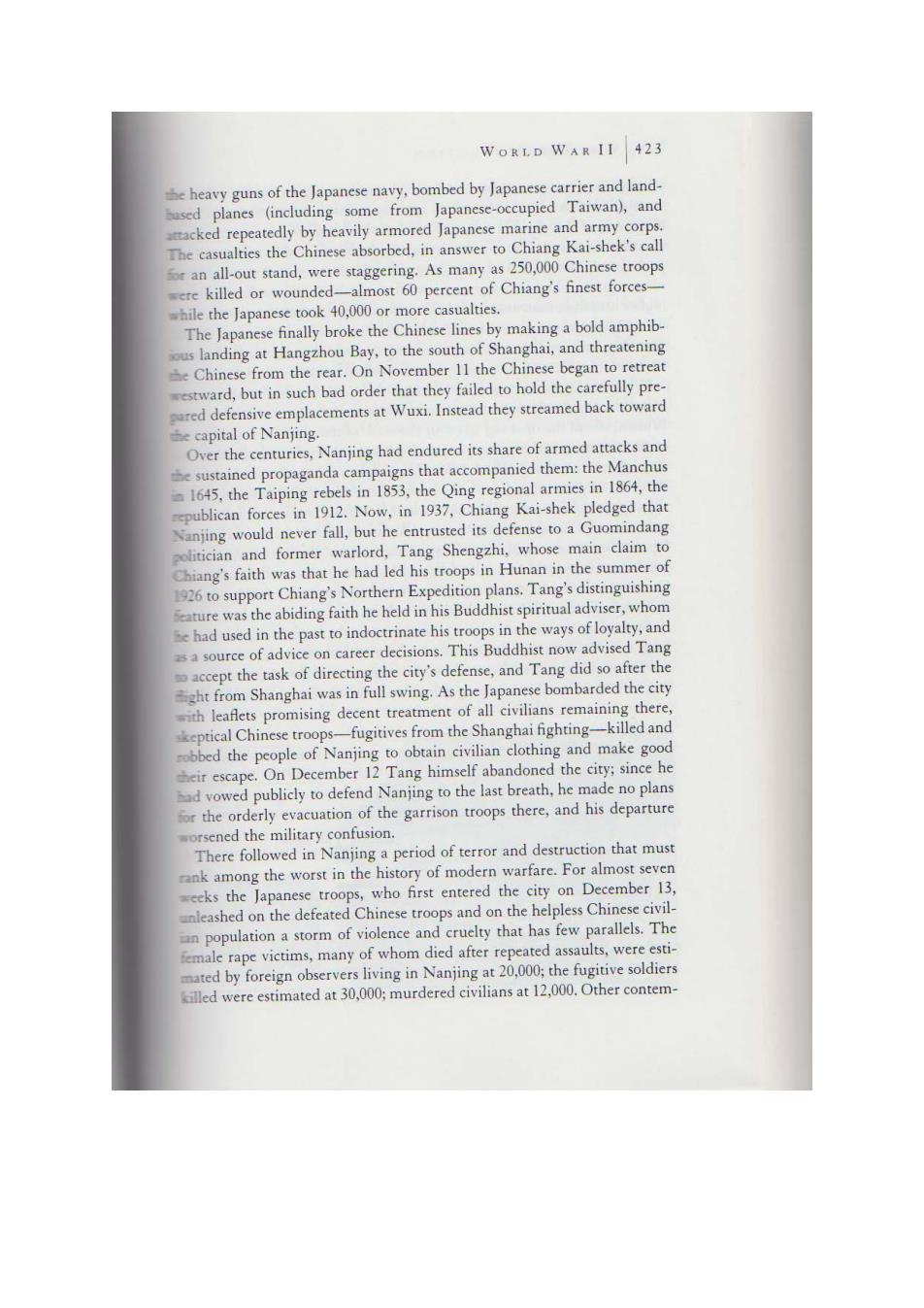
CHAPTER 17 World War II THE LOSS OF EAST CHINA 翻 During the spring of 1937 there was a period of calm,a deceptive respite before the cataclysm.While the Guomindang and the CCP arred for the propaganda initiative in embracing the united front,the panese watched warily.Arguments and tensions within the Japanese cab- tand army led to a change of government in early 1937;the new premier s General Hayashi Senjuro-previously an effective and forceful war inister-who nevertheless claimed in Tokyo during his maiden address. Ihave no faith in a pugnacious foreign policy."Hayashi's newly appointed eign minister stated publicly that to "avert a crisis at any time"with China,Japan had simply"to walk the open path straightforwardly."Iron- lly,during this lull,the Chinese army was growing more confident and ore restive.In May 1937 the American ambassador in Nanjing worried atanti-Japanese sentiments had now at last become"a part of the Chinese al consciousness,"and his counselor in Peking commented that an explo- onin Hebei might come from the Chinese armies'"growing belief in their n prowess." A number of large and small events then came together in what-cumu- ively-turned out to be a fateful way.Premier Hayashi's government ied to get its economic policies through the Japanese parliament,and was placed by a government headed by the influential but indecisive Prince Konoe.Japan's commanding general in north China suffered a heart attack, nd had to be replaced by a less experienced subordinate.And Chinese oops in the vicinity of the "Marco Polo Bridge"(Lugouqiao)decided to rengthen some shore-line defenses on the banks of the Yongding River 419

420 WAR AND REVOLUTION KOREA 。hnn Yellow Xi'an HENAN angha Hef HUREI SICHUAN ”Chonge4g East HUNAN GUIZHOUF- 通(Guiyang Guln。 GUANGXI TAIWAN shantou THE WAR WITH JAPAN: 北R JAPANESE EXPANSION July 1937-July 1938 July1938-1uy1939 02gn20 July 1939-December 1941 This bridge-about ten miles west of Peking-had once been famed fori beauty;Emperor Qianlong wrote a poem on the loveliness of the setting moon when viewed there in the first light of dawn.Now a strategical important railway bridge had been built next to it,linking the southern line with the junction town of Wanping.An army holding Wanping could com trol rail access to Tianjin,Kalgan,and Taiyuan,and for this reason the Japanese troops in north China often conducted maneuvers in the area, they were entitled to do by the Boxer Protocol of 1901. On July 7,1937,the Japanese chose to make the bridge the base of a nig maneuver by a company from one of the Peking garrison battalions.The troops were also authorized to fire blank cartridges into the air to simula combat conditions.At 10:30 P.M.the Chinese fired some shells into th

W ORLD WAR II 421 THE WAR IN NORTH CHINA. 1937 REHE HEBEI LIAONING Shanhaiguan Peking Marco Polo Bridg Tianjin ●Tanggu ●1 dshun Baoding★ Taiyuan SHANXI SHANDONG anese assembly area without causing casualties.But when one Japanese dier was missing at roll call,the Japanese commander,thinking the Chi- had captured the man,ordered an attack on Wanping.This attack, ch the Chinese beat back,can be considered the first battle of World 需rⅡ. The following day Chinese troops near the rail junction of Wanping anched an attack on the Japanese position,but were repulsed.Over the few days,though the shooting had stopped,there was a flurry of often coordinated negotiations,statements,and counterstatements.These came m the local military commanders on both sides,the Chinese and Japanese horities in Peking,the Chinese and Japanese regional commanders,and governments in Nanjing and Tokyo.Feelings began to run high.The aese War Ministry called for the mobilization of five divisions within an to handle contingencies that might arise in north and central China hile Chiang Kai-shek ordered four divisions to move into the area around oding in southern Hebei.Prince Konoe,in a press conference,insisted tthe incident was"entirely the result of an anti-Japanese military action the part of China,"and that"the Chinese authorities must apologize to for the illegal anti-Japanese actions."Chiang Kai-shek,from his summer

422 WAR AND REVOLUTION home in Kuling,announced that the previous agreements with the Japanese must stand as the status quo:"If we allow one more inch of our territory to be lost,"said Chiang,"we shall be guilty of an unpardonable crime against our race."3 On July 27,just as the local military commanders seemed to be working out withdrawal arrangements,more fighting,fierce this time,erupted around the Marco Polo Bridge.Japanese troops seized the bridge and dug in on the left bank of the Yongding River.By the end of the month they had consolidated their hold over the entire Tianjin-Peking region.Hearing of the Chinese defiance,Prince Konoe called for"a fundamental solution of Sino-Japanese relations."Chiang responded:"The only course open to us now is to lead the masses of the nation,under a single national plan,to struggle to the last." In a major military and strategic gamble,Chiang Kai-shek decided to deflect the Japanese from their campaign in north China by launching an attack on their forces in the Shanghai area.It was here that Chiang had the bulk of his best German-trained divisions,primed for action since the Com munists had been forced out of the Jiangxi Soviet onto the Long March. His forces outnumbered the Japanese in Shanghai by more than 10 to I. and he had taken the precaution of constructing-again with German advice-a protective line of concrete blockhouses in the area of Wuxi on the railroad to Nanjing,should retreat become necessary. On August 14,Chiang Kai-shek ordered his air force to bomb the Jap anese warships at anchor off the docks of Shanghai.If he had hoped that this would be a triumphal revenge for the humiliating destruction by the Japanese navy of the Qing forces at Weihaiwei in 1895,he was sadly dis appointed.Not only had the Nationalist air force lost the element of surprise when the Japanese intercepted and decoded a secret telegram,but the Chi- nese planes bombed inaccurately and ineffectively,missing the Japanese fleet and instead hitting the city of Shanghai,killing hundreds of civilians Despite this tragic fiasco,the commanding Japanese admiral announced that "the imperial navy,having borne the unbearable,is now compelled to take every possible and effective measure."Prince Konoe declared that Japan was now "forced to resort to resolute action to bring sense to the Nanjing government."5 With the "war"still undeclared,the Japanese government sent fifteen new divisions to north and central China.Chiang ordered his troops to overcome the Japanese in Shanghai at all costs,but they failed in their early attempts to break the Japanese defensive perimeter.In late August and all through September and October,the Chinese,now on the defensive,fought with extraordinary heroism,even though they were shelled continuously by

WORLD WAR I I 423 heavy guns of the Japanese navy,bombed by Japanese carrier and land- ased planes (including some from Japanese-occupied Taiwan),and acked repeatedly by heavily armored Japanese marine and army corps The casualties the Chinese absorbed,in answer to Chiang Kai-shek's call an all-out stand,were staggering.As many as 250,000 Chinese troops ere killed or wounded-almost 60 percent of Chiang's finest forces- hile the Japanese took 40,000 or more casualties. The Japanese finally broke the Chinese lines by making a bold amphib- ous landing at Hangzhou Bay,to the south of Shanghai,and threatening eChinese from the rear.On November 11 the Chinese began to retreat estward,but in such bad order that they failed to hold the carefully pre- red defensive emplacements at Wuxi.Instead they streamed back toward ecapital of Nanjing. Over the centuries,Nanjing had endured its share of armed attacks and esustained propaganda campaigns that accompanied them:the Manchus 1645,the Taiping rebels in 1853,the Qing regional armies in 1864,the publican forces in 1912.Now,in 1937,Chiang Kai-shek pledged that Nanjing would never fall,but he entrusted its defense to a Guomindang olitician and former warlord,Tang Shengzhi,whose main claim to Chiang's faith was that he had led his troops in Hunan in the summer of 26 to support Chiang's Northern Expedition plans.Tang's distinguishing ture was the abiding faith he held in his Buddhist spiritual adviser,whom had used in the past to indoctrinate his troops in the ways of loyalty,and a source of advice on career decisions.This Buddhist now advised Tang accept the task of directing the city's defense,and Tang did so after the ght from Shanghai was in full swing.As the Japanese bombarded the city ith leaflets promising decent treatment of all civilians remaining there, keptical Chinese troops-fugitives from the Shanghai fighting-killed and bbed the people of Nanjing to obtain civilian clothing and make good eir escape.On December 12 Tang himself abandoned the city;since he d vowed publicly to defend Nanjing to the last breath,he made no plans orthe orderly evacuation of the garrison troops there,and his departure orsened the military confusion. There followed in Nanjing a period of terror and destruction that must ank among the worst in the history of modern warfare.For almost seven eeks the Japanese troops,who first entered the city on December 13, leashed on the defeated Chinese troops and on the helpless Chinese civil- n population a storm of violence and cruelty that has few parallels.The emale rape victims,many of whom died after repeated assaults,were esti- mated by foreign observers living in Nanjing at 20,000;the fugitive soldiers illed were estimated at 30,000;murdered civilians at 12,000.Other contem-